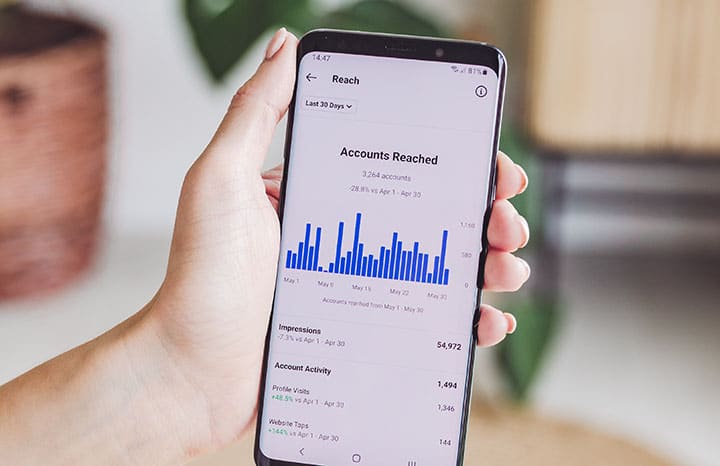How to Incorporate Social Media into SEO Strategy?
Despite that, it is very common for social media strategies to be far away from an SEO strategy. But why is that? Let us dive into some of the reasons:
- Social media posts and Social Media Profiles do not boost your ranking on search engine page results. At least not for Google, which is responsible for more than 80% of the total organic web traffic.
- Twitter or Facebook shares are not the same as quality backlinks from an authorized site.
- Social media and website traffic are different from each other. Even though, deep down, both of them measure how people are reacting to a piece of content your post, the mechanisms to measure that data are different.
So, how to incorporate social media into SEO strategy?
Does it make sense at all to do it?
The answer is: YES!

Have you ever noticed that social media profiles appear at the top of the SERPs? It is very common to see a Facebook or Pinterest profile ranking high for a particular query, and this is because people sharing your content is a strong social signal for Google that your content is valuable for users.
SEO and content marketing
A good SEO strategy begins with a good pack of keywords. Every time you create a blog post for your website, you intend to answer a question or give information about a theme that your research has proven important for users.
For content marketing purposes, keywords can be useful to determine the target audience and buyer persona.
At the same time, improving your SEO strategies is easier if you have at your disposal all the data derived from social media efforts.
Who has an interest in my content?
Is there a generational gap for my product or service that I am missing?
What type of content do people like the most?
What generates more leads for my business?
All the questions above find the answers in a joint effort between SEO and social media.
Keywords and hashtags.
There is virtually no difference between keywords and hashtags. If you use social media regularly, you probably have noticed that all of them have a “search” bar, where you can type almost anything and get a search result.
A user can type #SEOTips on Twitter and find a thread about how to boost your SEO effort, or they can type that into Google and find our blog post about that particular theme.
This means that once you have managed to rank your brand for a specific set of keywords, you can use that data to create the perfect pack of hashtags to use when posting on social media.
Creating brand awareness is not something that happens overnight. However, this process can take a faster route if your social media profiles and your website are on the same page in terms of keywords/hashtags, voice, design, and storytelling.

Social media can help with link-building strategies.
If you are in the SEO realm, you know how hard it can be to obtain quality backlinks for your website. Going up in the authority score is one of the necessary steps to put your brand at the top of the SERPs.
Yet, to do that, other pages must share your content with their audience, or they must refer to your website as a quality source of information or service.
The dynamics of social media can facilitate the link-building part of an SEO strategy. If your brand has a strong social media presence with tons of engagement, that increases the chances of someone reading your website content and using it later as a reference for other blog posts.
What are the most “SEO friendly” social media platforms?
This is a tricky question because not all social media platforms work the same way. They have different audiences and types of users. This is why you hear things like
“Facebook is for old people”
“Tik-Tok is only good for silly dances”
“Twitter is better to find information”
“Does anyone even remember Tumblr?”
Okay, that last one is a joke, but the point is that depending on what your audience wants, some platforms can work better for your business than others.
As we already told you, social media does not really have a direct impact on SEO rankings. Nevertheless, you can take advantage of the different features of these social media websites.
- Youtube
- Quora
What started as a simple platform to find a job has now evolved into the biggest leading generating social media website. Especially for B2B or business-to-business leads, LinkedIn has outperformed all the other social media platforms. Place the right set of keywords in your profile and on the content you publish, and LinkedIn´s algorithm can push you up into the SERPs.
Are you surprised to see a video platform on this list? Well, did you know that Youtube is now the second largest search engine machine in the world? That is right: Youtube has become a platform where people go to find answers to questions and more than just a website to watch music videos.
That is why now, every time you do an organic search on Google, Youtube videos pop up on the SERPs.
Youtube is great because even though videos can be tricky to produce, you can do a video about almost everything. Do not miss the opportunity to explore Youtube as a social media platform to boost your SEO strategy.
Just like Youtube, Pinterest has evolved from just a social media platform to an SEM. It is common for parents, teachers, therapists, and other professionals to bypass Google and go straight to Pinterest to find ideas for a project or entertainment.
The advantages of Twitter are given by the dynamics of the social media platform. You can share something very quickly and help make it viral.
Do not forget to use hashtags and quality information anytime you tweet.
Quora is one of those social media platforms that not many people use but it can be extremely useful for SEO strategies, especially for backlinks. Why is that? Because Quora speaks the same language as Google.
On Quora, users ask questions about relevant terms and themes, which is basically what you do every time you go online and search for something on Google. So, Quora can actually give you some beautiful insights for keyword research.
Do not miss a chance to answer the questions your audience has.
At Inspiral, we care about your vision and your brand. We want your voice to sound louder and louder so you can change more lives with your product or service.
Are you ready to take the journey of growing your business? Then take it with us!


